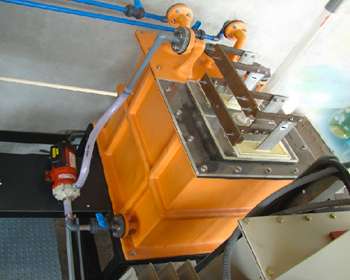PERCHLORATE TECHNOLOGY
Technologies / Perchlorate Technology
PERCHLORATE TECHNOLOGY
sodium perchlorate, potassium perchlorate production
The manufacturing process of Potassium chlorate involves the electrolysis of an acidified Potassium chloride solution in a specially designed Electrolyser.
Raw brine is treated to remove impurities such as calcium and magnesium. Alternatively high purity salt of 99% can be used. Noble Eco Systems’s Potassium chlorate manufacturing system consists of Electrolysers, a reactor, a cooler, Crystallizer, Centrifuge, Dryer, Inter-connecting piping.
When direct current is applied, the hydrogen gas is evolved at the Cathode, which displaces liquor and reduces the specific gravity of the electrolyte in the electrolyser and the outlet piping.The differential specific gravity between the liquor in the electrolyser and that in the reactor creates a high rate of circulation. The reactor is designed to provide the retention time required for conversion of intermediate reaction products to potassium chlorate.
The liquor from the reactor is treated to remove the sodium hypochlorite and then fed to the crystallization system. The crystallization system consists of a crystallizer, Vacuum equipment, a centrifuge and dryer. The crystallizer operates under vacuum conditions. In the vessel, water is flashed from hot incoming hypo-free chlorate liquor and crystal formation with growth takes place. The mother liquor is returned to the Electrolysers. The crystals are washed and dried to form the final product.

RT AME CHLOR ALKALI PLANT
| MODEL | Power Range | Capacity -Kg/day |
|---|---|---|
| PILOT PLANT | ||
| RTClO3 – 05 | LT | 5 |
| MINI PLANT | ||
| RTClO3 – 50 | LT | 50 |
| RTClO3 – 100 | LT | 100 |
| RTClO3 – 100 | LT | 250 |
| PRODUCTION PLANT | ||
| RTClO3 – 1000 | HT | 1000 |
| RTClO3 – 5000 | HT | 5000 |
| RTClO3 – 10000 | LT | 10000 |
| RTClO3 – 15000 | LT | 15000 |
| RTClO3 – 25000 | LT | 25000 |
D.C Power consumption: 5200 watt / ton of potassium chlorate production.
Potassium Chloride requirement: 560kg / ton of potassium chlorate production.
Benefits
- Simple modular cell design with monopolar / bipolar construction
- Increased capacities by adding cell modules
- Suitable for in-situ production of caustic soda – chlorine and hypochlorite even for small requirements
- Minimum corrosion
- Easy operation & Lower maintenance
- Low Cell voltage with narrow electrode gap.
- Amenable for continuous and batch operation
